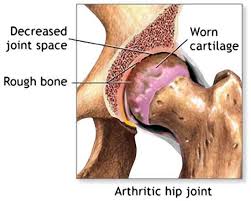Arthritis

What Is It?
Arthritis is a disease of the joints, especially the joints of the hands, spine, knees, hips, ankles and feet, however, it can affect any joint. The disease develops when the linings of the joints degenerate resulting in decreased mobility and pain. This wear and tear is most common in older people and those with activity related injuries however, it can affect younger people, especially if they've had injuries to the joints.
The most common types are Osteoarthritis (OA) and Rheumatoid Arthritis (RA) with the most prevalent of the two being OA.
OA is characterized by the wearing down of the lining of the joints after years of overuse. This usually comes with age, but there are other contributing factors such as obesity and old joint injuries, especially the weight bearing joints like the knees, hips, ankles, and feet.
OA develops slowly and it's usually not severe. You may have experience pain or discomfort in one or more of your joints and not think much of it until you notice that the pain is still there days later. That is when you should consult your physician to determine the source of your pain and make a diagnosis.

Joints that bear weight -- such as your knees, hips, feet, and spine -- are the most common places it affects. It often comes on gradually over months or years. It makes the affected joint hurt. But you don’t feel sick or have the fatigue that comes with some other types of arthritis.
When you develop OA, you lose your body's shock absorber. Cartilage, the slippery material that covers the ends of bones, gradually breaks down.
One example is what can happen to your knees when you're overweight. The extra pounds put more pressure on the cartilage as it gets squeezed between the bones. It gets damaged and wears away, so there isn't as much left to cushion the joint.
The damaged cartilage makes movement painful. You may hear a grating sound when the roughened cartilage on the surface of the bones rubs together. You may get painful spurs or bumps on the end of the bones, especially on fingers and feet. The joint lining can get inflamed, but it's not common with OA.
Symptoms of Arthritis

Symptoms come on gradually with pain being the main symptom which usually becomes worse with exercise. Many people report having joint stiffness mainly in the morning when they rise. This disease progresses with joint pain and tenderness and swelling increasing and joint motion decreasing. As the disease progresses, there can also be joint deformity, especially of the fingers and toes.
Medications that Help with the Pain
There are several over-the counter (OTC) pain medications that can help to decrease the pain and inflammation associated with arthritis. Products containing aspirin, ibuprofen, naproxen, and ketoprofen all can provide relief. Please be aware that these medications can be hard on the stomach, so they need to be taken with meals to decrease the risk of digestive complications.
Ask your pharmacist or physician what pain medication (analgesic) would be appropriate for you. He/she will consider the other medications you are currently on to see if there are any contraindications or adverse reactions that could be associated with that analgesic.
You should also ask your physician whether any over the counter analgesic would exacerbate a current condition that you may have. Your doctor can provide you with his/her recommendation for any OTC medication you are considering.
Supplements that may Help
Glucosamine sulfate, a nutrient derived from seashells, is an essential building block needed for the repair of joint cartilage. There are numerous studies that demonstrate the benefits of glucosamine sulfate in reducing the symptoms. Supplementing with glucosamine sulfate in not a cure for arthritis, but can be beneficial in relieving the aches and pains associated with the condition.
Chondroitin sulfate, a major component of the lining of our joints has been shown to be decreased in people suffering with RA. As a result, there is potential for restoration in joint function when supplementing with chondroitin sulfate. Several double-blind trials have shown that supplementing with this substance may support reduced pain and increased mobility.
Research also suggests that fish oil, a popular supplement for heart disease and RA may also help osteoarthritis. Fish oil is the best source of omega-3 fatty acids, essential fatty acids our body needs to function properly and is a very popular supplement for OA sufferers.
In this day and age, people are leading more active lifestyles and may need to reduce their activities as a result of many disease states. Stay active by taking the time to eat well and exercise and consult with your doctor or pharmacist to see if over-the-counter anti-inflammatories or dietary supplements may be right for you.